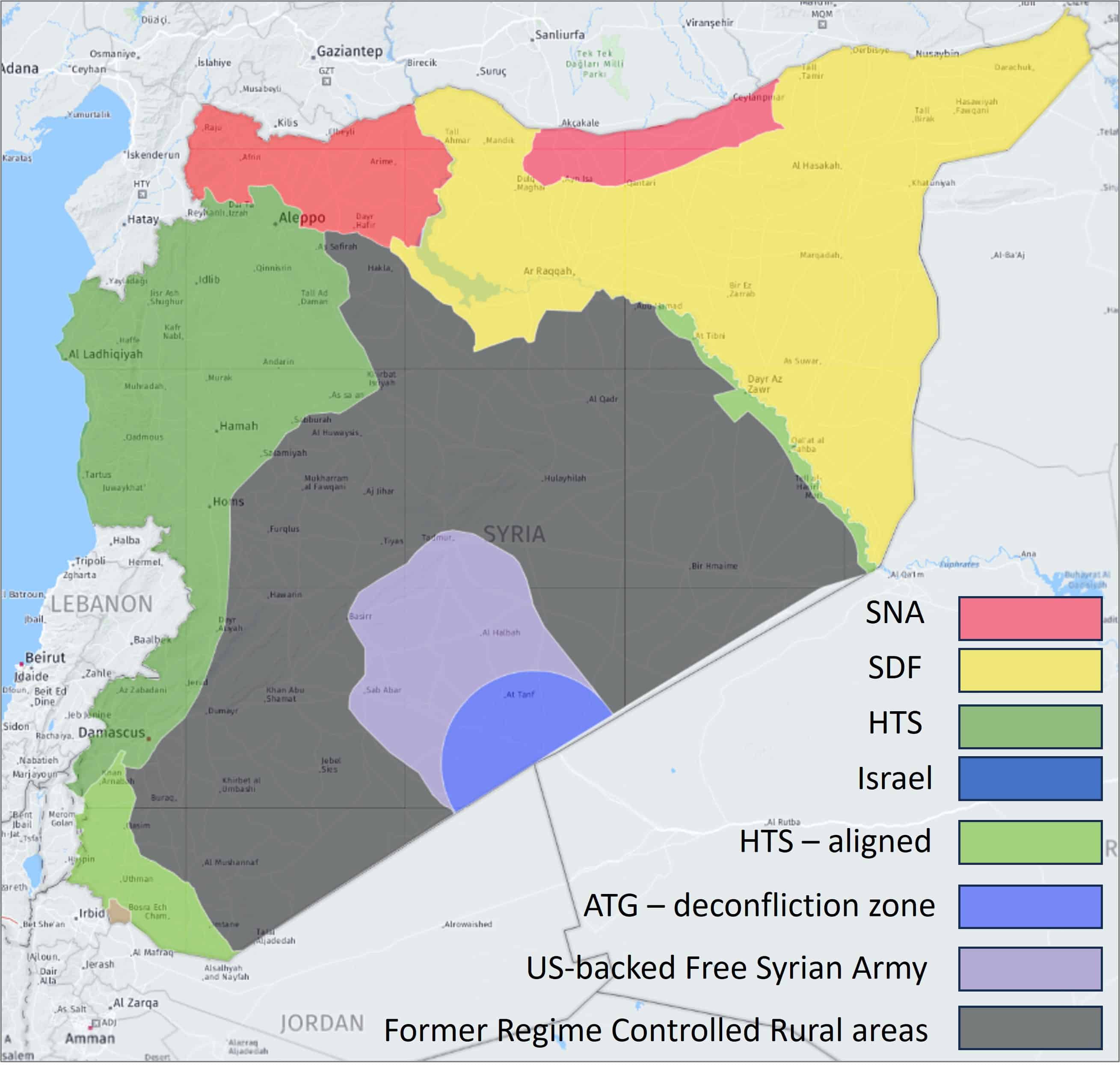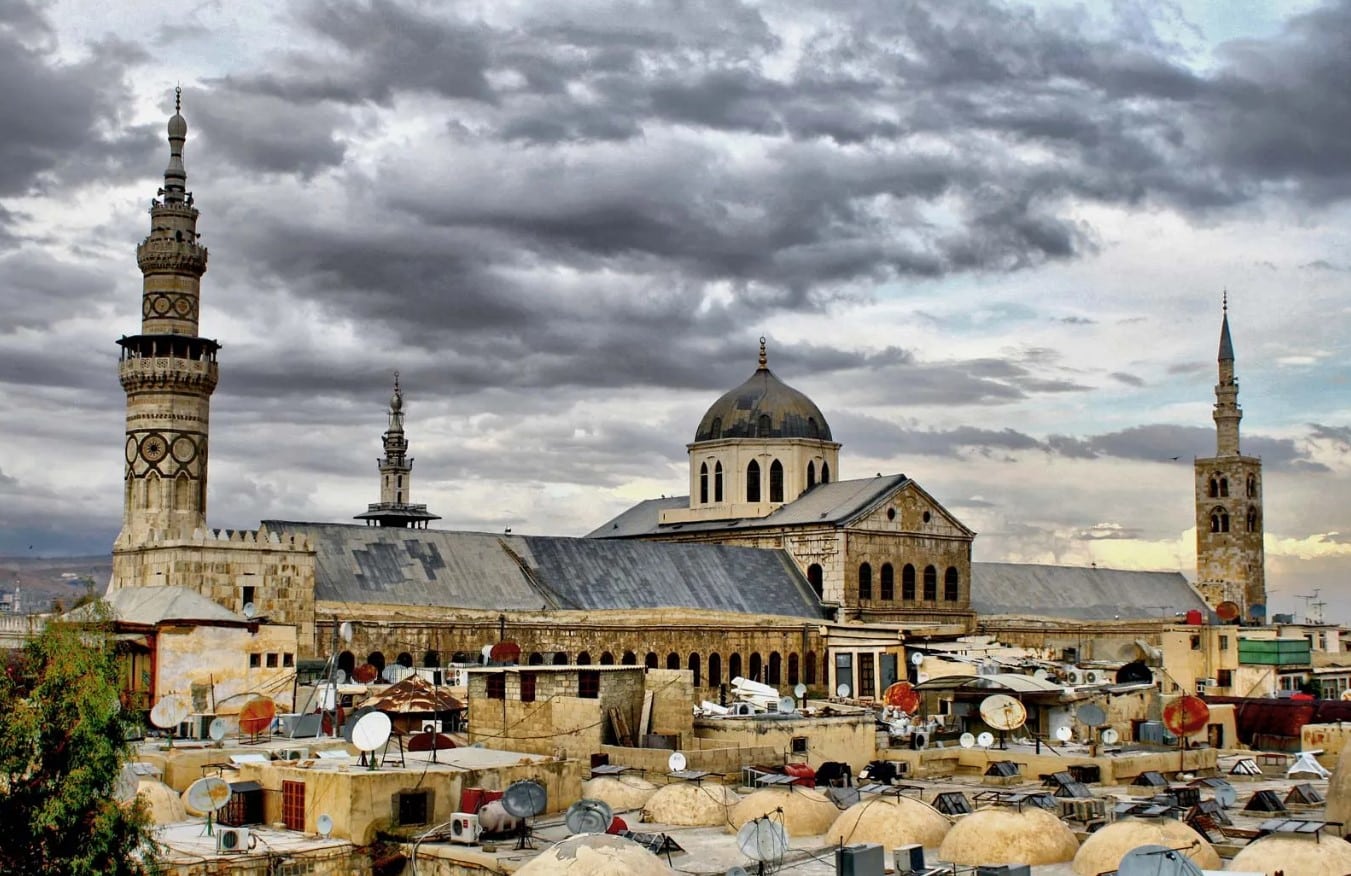Weekly Incident Map
Dear subscriber. Welcome to the Syria Weekly Report – a brand-new reporting service launched by Talos that provides high-quality information and analysis on Syria. The report is focused on broader strategic and political developments in the country, as well as Syria’s relations to regional stakeholders and surrounding countries. The report is disseminated every Tuesday and is complemented by a daily report.
The service will be provided for our existing subscribers for free for a limited time period and then offered as a separate, stand-alone product outside your regular subscription. For inquiries regarding prices for a subscription, or the availability of bespoke reporting on Syria – including in-depth reports, risk assessments and incident data – please email [email protected]. Please also contact us if you are interested in transportation or other security services in Syria. In the meantime, please enjoy this complimentary service.
Executive Summary
-
EU and US proceed towards easing sanctions on new government
-
Arab League delegation visit signalled effort to rejoin organization
-
New government faces pockets of resistance
-
Interim government rejects SDF proposal as integration efforts fail
-
IS attack in Damascus foiled as attacks in the east continue
EU and US proceed towards easing sanctions on new government
The EU and US continue to make small but significant gestures of normalization toward the interim government led by Tahrir al-Sham (HTS), with associated developments this week shaped indications that current sanctions on the government may be lifted in the near future. On 17 January, multiple sources citing anonymous US officials said the outgoing Biden administration notified Congress regarding limited sanctions waivers that will allow several regional countries to provide humanitarian assistance to Syria without facing sanctions. The sanctions pertain to the Foreign Assistance Act of 1961 and are related to Syria’s designation as a State Sponsor of Terrorism, and encompass several regional countries including Bahrain, Iraq, Jordan, Kuwait, Lebanon, Oman, Qatar, Saudi Arabia, Turkey, the United Arab Emirates and Ukraine.
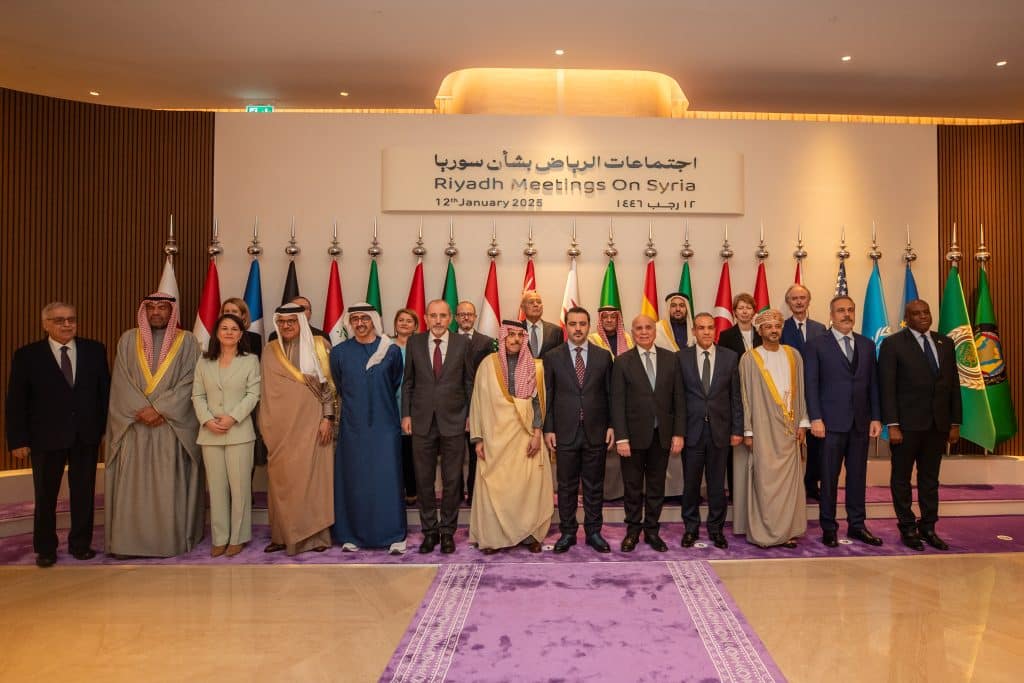
EU and GCC leaders met in Riyadh to discuss future of Syria
This small but significant gesture followed statements by EU members and UN officials earlier in the week that likewise indicate growing international support for lifting sanctions imposed on the former government with a view to aid the reconstruction effort and alleviate humanitarian conditions in the country. Speaking during a regional conference in Riyadh on 12 January, the High Representative for Foreign Affairs and Security Policy and Vice-President of the European Commission, Kaja Kallas, said the EU would convene a meeting on 27 January to discuss the lifting of sanctions on the new government. The next day, international media sources reported that six European countries signed a document that urged the EU to “immediately commence adjustments to the sanctions regime.” The document – signed by Germany, France, the Netherlands, Spain, Finland and Denmark – calls for the lifting of sanctions on a number of key sectors including transportation, energy and banking with a view to facilitating civilian flights, easing restrictions on imported goods as well as on the export of oil and gas. Later in the week, the UN Commissioner for Human Rights, Volker Türk, also called for Western sanctions on Syria to be lifted. Addressing members of the media after meeting with the senior HTS leadership, Türk stressed that the “people of Syria need every ounce of help they can get to rebuild the country” and expressed concerns over the impact of international sanctions on the lives of ordinary Syrians: “I therefore call for an urgent reconsideration of sectoral sanctions with a view to lifting them”, Türk said.
The calls for sanctions relief remain conditioned on the government’s commitment to a peaceful and inclusive political transition, particularly when it comes to respect for minority and women’s rights. This was especially emphasized by Kallas who, in her remarks on 12 January, seemed to express support for lifting various sanctions but only on the condition that the government shows actual progress on these matters. Likewise, the US – while prepared to introduce waivers pertaining to certain areas – remains reluctant to lift the sanctions under the Foreign Assistance Act fully and the designation of the HTS as a Foreign Terrorist Organization, with both designations remaining in place as the new administration President Trump takes office.
For now, these measures appear primarily intended to incentivize the new government to demonstrate its commitment to its stated goals and it is likely that any further sanctions reliefs will be implemented gradually and with very clear conditions. Regardless, the rhetoric and measures announced this week are a political victory for the HTS-led government in its effort to build trust in the West and alleviate concerns linked to the group’s extremist roots. The measures are also a testament to the group’s ability, so far, to control more extremist elements within its ranks and to maintain law and order through what has so far been a relatively peaceful and inclusive transition.
Arab League delegation visit signalled effort to rejoin organization
Political developments this week were also marked by the HTS-led government’s continued integration and engagement with regional stakeholders. This is most notably marked by ongoing efforts to rejoin the Arab League – a step that would constitute a significant symbolic victory and solidify its legitimacy and status in the region. On 17 January, a delegation of Arab League representatives, led by Assistant Secretary-General Ambassador Hossam Zaki, arrived in Damascus for a two-day visit to meet with senior officials of the new government. In a press conference, interim foreign minister Asaad al-Shaibani reiterated Damascus’ intent to regain its seat in the league and also called on members to support the reconstruction effort in the country. For his part, Assistant Secretary-General Zaki said the league is working with member states to reactivate Syria’s membership while calling for the lifting of sanctions “that are no longer justified.”
Few additional details were provided of the discussion points, however the visit consolidates the perception that the new government is likely to retake its seat in the league. To recall, the Arab League suspended Syria in 2011, shortly following the outbreak of the civil war, but then voted to reinstate its membership in 2023 before it was again suspended in light of the government collapse in December 2024. The decision to readmit Syria in 2023 was largely driven by the GCC states – notably Saudi Arabia, the UAE, and Bahrain’s – decisions to normalize ties with the Assad-led government, and these countries will likely retain a significant influence on any decision to reinstate the country again. During last week’s conference in Riyadh, Saudi Arabia and other GCC states expressed support for the new government and unanimously called for sanctions to be lifted – indicating strong support for readmitting the new government in the league as well. For their part, the HTS-led government has taken several steps to engage with Saudi Arabia since assuming power, with a government delegation visiting Riyadh on 1 January and then later participating in the regional summit last week. These visits suggest a clear effort to lobby the GGC states and were assessed to lay the groundwork for promoting Syria’s return to the league.
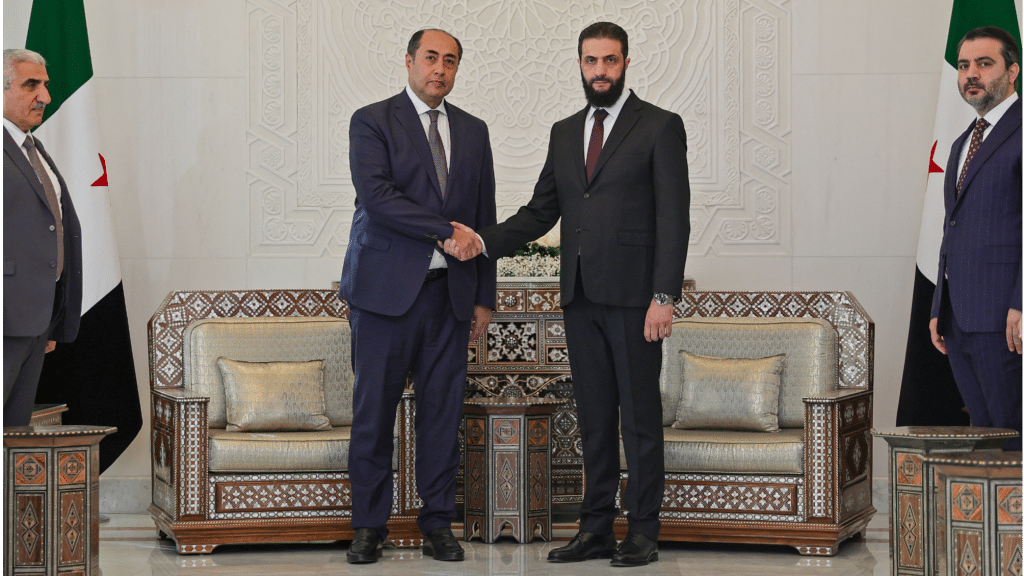
Arab League Assistant Secretary General Hossam Zaki and HTS leader Ahmed Saraa
For Saudi Arabia and the UAE, Syria’s return to the league forms part of an assessed effort to extend their influence in the new Syria, primarily through economic investments and humanitarian support that would allow for the cultivation of political influence at both a government and grassroots level. Beyond economic investment opportunities, this would also serve to limit Iran’s influence in the country – a goal supported by Israel, the US and Turkey. The incoming Trump administration has so far yet to formulate a clear policy on the new government, but these considerations may encourage the US to support Damascus’ integration with the GCC states and Turkey with a view to cut off Iran from re-establishing its influence in the country.
It is worth noting that any decision to readmit Syria will have to be taken unanimously by all member states in the next summit which is scheduled to be held in Baghdad this year. Iraq will here play a key role, not only in hosting the meeting but also due to its complicated relationship with the HTS and its close ties with Iran. To recall, HTS leader Ahmed al-Sharaa is a former member of al-Qaeda in Iraq (AQI) and fought on behalf of the group for three years in Iraq during the insurgency. So far, the GoI’s position has been one of caution and given the historical context, Baghdad may be less willing to overlook the HTS’ past than other countries in the region. Iran may here seek to oppose Syria’s reintegration by lobbying Iraq ahead of the summit, with conditions now set for the emergence of a more rivalrous relationship between Iran and the GCC states in Syria following years of reduced tensions and cordial relations.
New government faces pockets of resistance
The situation in government-controlled areas of the country remains relatively stable and this week formed no exception, as the HTS and affiliated groups continue to exercise considerable control. The majority of incidents and hostile activity reported within the HTS-controlled areas, including the capital Damascus, remain driven by criminality and assessed local disputes that have limited political significance. HTS-led security forces continue to conduct security operations targeting criminal elements and other law enforcement efforts. That said, isolated acts of retribution targeting individuals linked with the former government, including mayors and province-level political leaders, were occasionally reported over the week. This included the execution of two individuals outside the city of Damascus on 16 January, with the two victims reported to be former regime officers. On the same day, a former mayor and head of the Baathist branch office in the al-Tal area was also executed by unknown perpetrators. These acts are not assessed to be directly sanctioned or ordered by the HTS, however the extent to which these comprise local-level acts of retribution or signs of systemic acts remains unclear.
In a more significant development, clashes broke out on 14 January in the Latakia province between the HTS security forces and supporters of a group loyal to the former government in the Ain al-Sharqiya, Jableh district. The clashes were initiated following a routine patrol during which members of the group, led by Bassam Hussam al-Din, captured seven HTS members and made demands for self-rule for the Alawites and the withdrawal of foreign fighters. In response, HTS launched a security operation involving helicopters and drones, freeing the captives and arresting several individuals. The leader of the group, al-Din, reportedly killed himself during the engagement.
The engagement coincided with a claim by the so-called “Syrian Popular Resistance” – a pro-Assad group that launched an armed resistance against the HTS in December – that it killed dozens of HTS members (some sources said 35 HTS members were killed) in western Homs province near the Lebanese border. The incident was not independently confirmed and the death of 35 members appears greatly exaggerated however the claim coincided with clashes involving Lebanese Hezbollah near the areas of Hermel and Qusayr. The link between the statement, the border clashes and the incidents in Latakia remain limited, but these illustrate persistent intent by resistance groups to oppose the HTS.
In a separate but related development earlier this week, on 10 January, a group calling itself “Saif al-Bahr” issued a statement announcing its defection from the HTS (referred to as “al-Jolani’s forces”). The group declared the start of a conflict against al-Jolani’s forces, accusing them of supporting the establishment of a national army and a secular government. So far, the group has not been involved in any confirmed acts of violence and the level of organized armed resistance is currently not assessed to threaten the HTS’ control. Spontaneous outbreaks of sectarian tensions involving Alawite resistance groups and attacks against HTS security forces are however expected to continue to be reported in Damasus, Latakia, and the central provinces. Related signs of more organized and coordinated resistance that may pose a more serious threat to the HTS will be monitored closely.
Interim government rejects SDF proposal as integration efforts fail
The situation in the North and Eastern areas remains volatile and characterized by continuing clashes between the SDF and the Syrian National Army, supported by Turkey and the HTS. This week, no significant frontline changes were noted however intense airstrikes and rocket activity were observed in the vicinity of the Tishreen Dam, where Turkish airstrikes targeted SDF and supporters on multiple occasions. On 15 January, local sources stated that an airstrike targeted a civilian convoy near the dam and the next day a gathering of SDF supporters was struck during a protest near the dam that voiced support for the SDF. In response, the SDF conducted multiple counter-operations and used rocket fire to target advancing SNA elements in southern Manbij, in a bid to stall the advance.
Two VBIED attacks were also recorded this week in Manbij city, with the first conducted on the evening of 17 January and the second on 19 January. No casualties were inflicted during the first attack however at least three civilians were reportedly injured by the attack. The attribution for the attacks remains unclear since no group has claimed responsibility yet with the city being under the control of the SNA – and used as a significant supply route used by the SNA to ship equipment towards the Tishreen Dam – speculative reports indicate the likely involvement of the PKK/YPG.
On a political level, these developments coincided with negotiations and attempts by the HTS-led government and the SNA to disarm the SDF, and to integrate the group into a new Syrian army. This week, SDF Commander Mazloum Abdi addressed the issue in a press interview and said one of the group’s key demands is to be part of a “decentralized” administration and that the group would be open to integrating with the Ministry of Defence, but only as a “military bloc” without dissolving. This stands in contrast to demands by the HTS to integrate the SDF “on an individual basis” and not as a separate entity, and by Turkish efforts to disarm and dissolve the group.
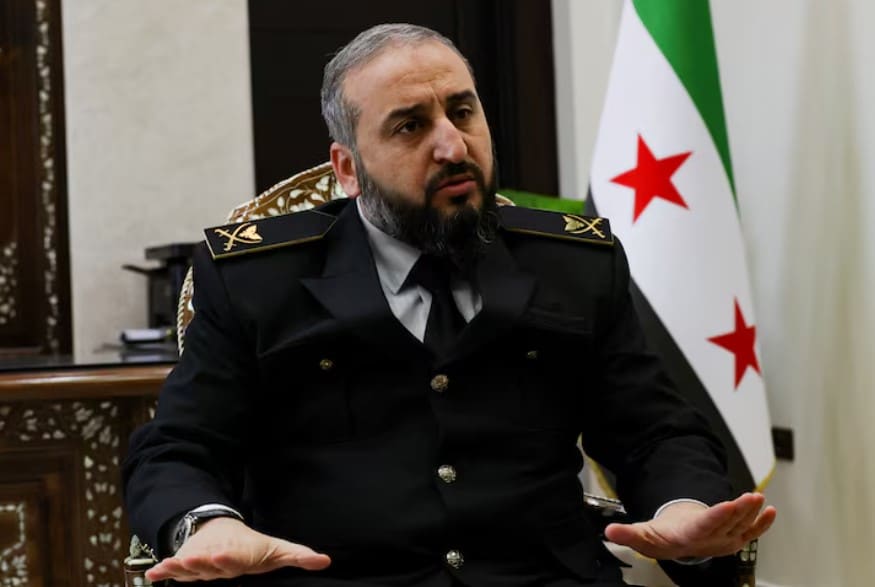
Defense minister Murhaf Abu Qasra
The related discussions were furthered this week during a meeting between senior HTS leaders and Turkish officials in Ankara, widely seen as promoting their joint coordination on the matter. On 19 January, Defence Minister Murhad Abu Qasra publicly rejected the SDF’s proposal for integration as a “military bloc” and also accused the group of “procrastinating” over the issue of integration. The statement came after a meeting in Damascus hosted by the Ministry of Defence and attended by some 60 armed factions to discuss the formation of a new unified command structure. The SDF criticized the meeting and said it was not invited to the talks, with Adbi stating that the outcome of the meeting “does not concern the SDF”.
These integration efforts remain important to monitor given the situation in the North and East where the SNA, Turkey and the HTS will likely coordinate to ramp up pressure on the SDF as a way to forge concessions during the negotiation process. Multiple reports towards the end of the week suggested the deployment of additional SNA and HTS elements towards the frontlines in Aleppo and Deir Ez Zour – in a move likely intended as a show of force and pressure tactic amidst current negotiations. More ominously, the movements may indicate an intent by Turkey to launch a military operation against SDF-controlled areas, as has been speculated in recent weeks. Speaking to Turkish media outlets on 19 January, anonymous Turkish officials again warned that a military operation would take place unless the PKK leaves the country, with the statements likely made to add weight to the military movements on the ground. While a ground incursion cannot be discounted, such rhetoric can be expected to continue from Turkish officials over the coming weeks.
IS plot in Damascus foiled as attacks in the east continue
The tempo of IS activity in Syria remains elevated and the near-daily attacks recorded this week in eastern Syria solidifies existing concerns over the group’s possible resurgence in the country. This week, assessed IS attacks continued to target SDF sites and vehicles, primarily in eastern Deir Ez Zour province. This included the detonation of roadside IEDs against SDF vehicles as well as oil tankers transiting in rural areas. Other engagements involving small arms and RPG were also reported during the week, targeting both SDF and members of US-backed Free Syrian Army elements, yet no significant casualties were discussed as a result.
In a more significant development this week, the General Intelligence Service and the Public Security Department announced the prevention of an IS attack on the Sayyida Zeinab shrine near Damascus on 11 January. The security operation led to the arrest of several IS-affiliated individuals found with foreign documents, weapons, and explosives. Few details of the attack plot were provided but the statement noted that the plan involved the use of explosive devices. It is worth noting that the shrine has been targeted in the past, most recently in 2023 when a motorcycle-borne IED detonated outside, killing six people and injuring dozens of others. Beyond illustrating the persistent threat of IS attacks in the capital, the foiling of the plot serves to shore up the credentials of the new government, and in particular its commitment to protecting Shia shrines and other religious minority sites in the country.
Control of Terrain Map – 21 January 2025
